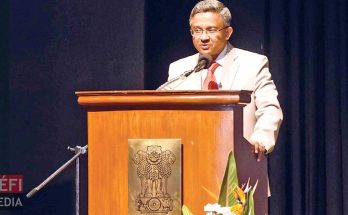 India hopes to become a member the Shanghai Cooperation Organization (SCO) at its Ufa Summit on 9-10 July 2015. A formal application was put in last year when all legal hurdles were removed – short of ratifying a lengthy 28 draft documents of the grouping.
India hopes to become a member the Shanghai Cooperation Organization (SCO) at its Ufa Summit on 9-10 July 2015. A formal application was put in last year when all legal hurdles were removed – short of ratifying a lengthy 28 draft documents of the grouping.
A recent statement coming from Moscow suggests, however, that the accession of India and Pakistan to the SCO is still being examined. Is there a new hitch?
Until now, the delay was caused by the lack of criteria, procedures and timeline. Only Mongolia was welcomed but it hesitated to join the outfit. In 2010, UN sanctions obstructed Iran’s entry.
Despite Russia pushing India’s case and China for Pakistani entry, the SCO remained reticent that fearing it would get mired into the South Asian conflict. Some cited SAARC’s failure as an alibi. Others saw India’s proclivity as being towards the West and East rather than Eurasia.
New Imperatives
In spite of its high visibility, the SCO has found real progress elusive. In fact, only Chinese funding has kept it alive, with Beijing actively using the forum for enlarging its own footprints in Central Asia.
The tricky aspects of ‘regime security’ have also impeded the SCO’s growth. In fact, the frequently held anti-terror drills under SCO auspices were tied to curbing potential domestic upsurge as much as to guarding against external threats.
But fresh imperatives have hit Central Asian states lately. Importantly, their key mentor, Russia, is in deep crisis. Sanctions apart, the whopping fall in oil prices and the value of the rouble are having ripple effects on Central Asian states as well. At the same time, they also fear Russia’s renewed nationalistic and economic assertion. Then there is the impact of growing Sino-Russian proximity, which is compelling Kazakhstan and even Uzbekistan to seek diversification beyond the immediate region. Security challenges also loom large. The Afghan fallout apart, the ISIS is heavily recruiting in Central Asia – an additional cause of concern.
In the light of all this, bringing India, Iran and others into the SCO would mean gaining greater voice and cachet for the SCO. Some also fear that not doing so would make Iran and India slip out and join the US regional game.
New Strategic Axis
Nevertheless, the coming prospects at SCO are unlikely to be delinked from the current rebalancing games that are underway in the global arena.
Clearly, the Sino-Russian strategic propinquity in Eurasia and elsewhere has now become explicit. There is little scope for altering that equation for now. Despite talk about the undercurrents of Sino-Russian competition in Eurasia, Putin has recently made it clear that the SCO will operate “actively on convergence between two big projects” – the China-led Belt and Road, and the Moscow-led Eurasian Economic Union (EEU). This reflects strategic clarity and the two projects may become the main driving force for Euro-Asian connectivity and integration; a top strategic priority for dealing with regional security threats. At the Ufa Summit, this could become a key to “SCO Development Strategy Towards 2015”.
From India’s perspective, such a vision for Eurasia is likely to be at odds with Modi’s foreign policy texture, especially his shared vision with Obama for the Asia-Pacific and Indian Ocean Region that are ostensibly meant to contain China. While India has expressed its desire to cooperate with the Moscow-led EEU, it hasn’t quite approved Beijing’s Belt and Road idea. Instead, it has expressed its resentment towards China’s plans for the USD 46 billion economic corridor through Pakistan-occupied Kashmir. Here lies a potential problem. Beijing has already turned down India’s objection in this regard, saying it is a “livelihood project”. The differences it seems will only enlarge and for India navigating the evolving contradictions in SCO may remain less than a smooth one.
India’s Stakes
Sceptics at home oppose India joining a Chinese-led body as a junior member. But for India, SCO is about increasing its stakes in Central Asia – the next emerging Muslim region with close proximity to Afghanistan. Clearly, India’s concerns seem essentially security driven, fearing that SCO could possibly be used as a smokescreen by inimical forces including Pakistan to drum up support for anti-India activities. Thus, staying outside cannot be to India’s advantage.
Security concerns also drive Russian and Chinese actions in Eurasia but the approaches they follow are economic in orientation. Clearly, joining SCO could help India get out of the current tight geopolitical spot – wedged between a wall of Pakistani hostility and fear of cooperating with China.
Stakes are also high for securing energy and connectivity interests – to invest in oilfields also with an eye to get its way on the pipeline route. SCO could change the way for energy projects, including the TAPI which may finally see the light of day.
India could benefit from SCO’s Regional Anti-Terrorist Structure (RATS) and also learn from its counter-terror exercises. India could also gain from cooperating in soft-political areas of the region that it knows little about.
Conversely, India could bring to the SCO table its techno-economic expertise, markets and financial commitment. India’s experience in dealing with multi-cultural settings is an attraction among many sections in Central Asia.
Ironically, Pakistan has quite successfully inserted itself into this new alignment. Even Russia’s confidence in Pakistan seems to have increased though it may have an opportunistic aspect. Clearly, the acceptance of Pakistan in Eurasia would grow henceforth. Pakistan has its geographical advantage unless Afghanistan continues to remain a thorn.
Option for India
For India the issue is quite clearly about its strategic ambivalence and lack of clarity. The SCO is more often than not used as a counterweight against the West. For Modi to play an ancillary role of offsetting the US is tricky.
Earlier Pakistan used to run with the hare and hunt with the hounds for the US. It seems this role is being passed on to India now.
For Prime Minister Modi, it would be prudent not only to display pragmatism but also clarity. Surely, any attempt at matching the Russian or Chinese leverages in Eurasia would be unrealistic. He should instead use the SCO for building greater convergences with China and Russia.
For sure, Moscow and Beijing and even Astana possibly relish the idea of using the SCO forum to beget a serious India-Pakistan thaw. But creative diplomacy by Modi could minimize the impact of the China-Pakistan alignment, which has tended to undercut India’s direct access to Central Asia.
Modi should also know the fragile nature of the SCO. Central Asians especially carry varied expectations; they remain sensitive to ties with Russia and China, but their positions fluctuate regularly in line with their interests, even opting for bilateralism with the US. They ably play the suitors off one against the other to extract economic benefits and reinforce political control at home.
Clarity is also necessary to avoid the risk of India becoming a focal point of criticism by Central Asia States, like the way it happens in SAARC, of course for different reasons. So long as India was not a full member, expectations from it were less. But once India is in, the regional countries are going to compare India with China.
(Courtesy : IDSA)
Author Profile
- India Writes Network (www.indiawrites.org) is an emerging think tank and a media-publishing company focused on international affairs & the India Story. Centre for Global India Insights is the research arm of India Writes Network. To subscribe to India and the World, write to editor@indiawrites.org. A venture of TGII Media Private Limited, a leading media, publishing and consultancy company, IWN has carved a niche for balanced and exhaustive reporting and analysis of international affairs. Eminent personalities, politicians, diplomats, authors, strategy gurus and news-makers have contributed to India Writes Network, as also “India and the World,” a magazine focused on global affairs.
Latest entries
 DiplomacyApril 10, 2024Diplomat-author Lakshmi Puri pitches for women power at LSR
DiplomacyApril 10, 2024Diplomat-author Lakshmi Puri pitches for women power at LSR India and the WorldApril 6, 2024UN envoy pitches to take India’s solutions to the world stage
India and the WorldApril 6, 2024UN envoy pitches to take India’s solutions to the world stage CultureApril 5, 2024Youth in Diplomacy: Making it Matter with LSR Model UN 2024
CultureApril 5, 2024Youth in Diplomacy: Making it Matter with LSR Model UN 2024 India and the WorldMarch 28, 2024India to China: Normalization of troops deployment imperative for restoring ties
India and the WorldMarch 28, 2024India to China: Normalization of troops deployment imperative for restoring ties







